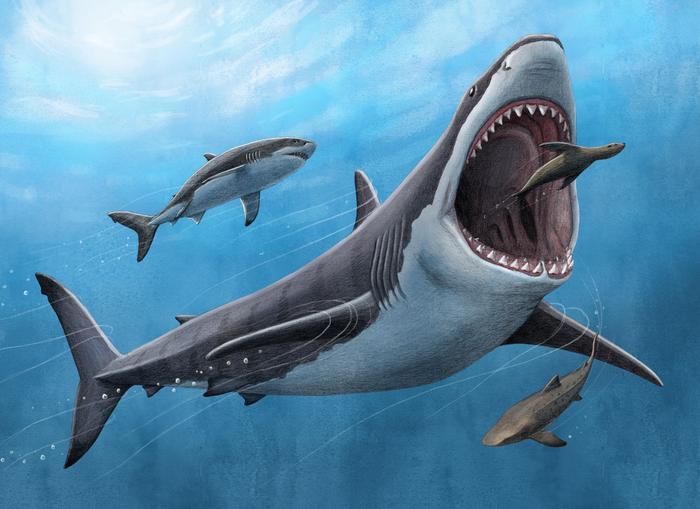William Paterson University PRESS RELEASE

Credit: Alex Boersma/PNAS
William Paterson University PRESS RELEASE
EMBARGOED UNTIL MONDAY, JUNE 26, 2023, 3:00 PM EST
WAYNE, NEW JERSEY — A new study shows that the gigantic Megalodon, or megatooth shark, was warm-blooded. This latest research on the Megalodon, which lived in the world’s oceans from 23 million to 3.6 million years ago and measured about 50 feet in length, appears in the peer-reviewed journal Proceedings of the National Academy of Sciences.
The study, conceived of and led by Michael Griffiths and Martin Becker, both professors of environmental science at William Paterson University, used fossil teeth to determine that the Megalodon’s body temperature was much higher than previously thought.
Also involved in the study were Kenshu Shimada, a paleobiologist at DePaul University in Chicago, Robert Eagle at the University of California at Los Angeles, and Sora Kim at the University of California at Merced. Other coauthors of the paper include researchers from Florida Gulf Coast University in Florida, Princeton University in New Jersey, and Goethe University Frankfurt in Germany.
Previous studies have suggested that the Megalodon (formally called Otodus megalodon) was likely warm-blooded, or more precisely regionally endothermic, just like some modern-day sharks. However, those findings were based on pure inference, the researchers say. Their study provides the first empirical evidence of warm-bloodedness in the extinct shark.
The research team used a novel geochemical technique, involving clumped isotope thermometry and phosphate oxygen isotope thermometry, to test the “Megalodon Endothermy Hypothesis.”
“Studies using these methods have shown them to be particularly useful in inferring the thermo-physiologies of fossil vertebrates of ‘unknown’ metabolic origins by comparing their body temperature with that of co-occurring fossils of ‘known’ metabolisms,” explains Griffiths, of William Paterson University, the lead author of the study.
Clumped isotope thermometry is based on the thermodynamic preference for two or more ‘heavier’ isotopes of a particular element (due to extra neutrons in the nucleus), such as carbon-13 and oxygen-18, to form bonds in a mineral lattice based on the mineralization temperatures. The degree to which these isotopes bond or ‘clump’ together can then reveal the temperature at which the mineral formed. Phosphate oxygen isotope thermometry is based on the principle that the ratio of the stable oxygen isotopes, oxygen-18 and oxygen-16, in phosphate minerals depends on the temperature of the body water from which they formed.
The new study found that Megalodon had body temperatures significantly higher than sharks considered cold-blooded or ectothermic, consistent with the fossil shark having a degree of internal heat production as modern warm-blooded animals do. Among the modern-day sharks with regional endothermy is a group that includes mako and great white sharks with the previously reported average body temperature ranging from 22.0 to 26.6˚C, which may be 10 to 21˚C higher than ambient ocean temperature. The new study suggests Megalodon had an overall average body temperature of about 27˚C.
Otodus megalodon has a rich fossil record, but its biology remains poorly understood, like most other extinct sharks, because no complete skeleton of the cartilaginous fish is known in the fossil record. Luckily, its abundant teeth remain and can serve as a door to the past.
“Otodus megalodon was one of the largest carnivores that ever existed and deciphering the biology of the prehistoric shark offers crucial clues about the ecological and evolutionary roles large carnivores have played on marine ecosystems through geologic time,” says Shimada.
The ability of Otodus megalodon to regulate body temperature is evolutionarily profound because the evolution of warm-bloodedness is thought to have also acted as a key driver for its gigantism. Previous geochemical investigations by Griffiths, Becker, and their colleagues have suggested that Otodus megalodon was a significant apex predator, residing at the very top of the marine food chain.
The high metabolic needs associated with maintaining warm-bloodedness may have contributed to the species’ extinction, the researchers say.
“Because megalodon went extinct around the time of extreme changes in climate and sea-level, which impacted the distribution of and the type of prey, our new study sheds light on the vulnerability of large marine apex predators, such as the great white shark, to stressors such as climate change,” says Griffiths, highlighting the need for conservation efforts to protect modern shark species.
This collaborative work was made possible through financial support from the National Science Foundation Sedimentary Geology and Paleobiology Award to Griffiths and Becker (Award #1830581), Eagle (Award #1830638), Kim (Award #1830480), and Shimada (Award #1830858), and an American Chemical Society Award, Petroleum Research Fund Undergraduate New Investigator Grant (PRF #54852-UNI2) to Griffiths.
###
Journal
Proceedings of the National Academy of Sciences
DOI
10.1073/pnas.2218153120
Method of Research
Experimental study
Subject of Research
Not applicable
Article Title
Endothermic physiology of extinct megatooth sharks
Article Publication Date
26-Jun-2023




